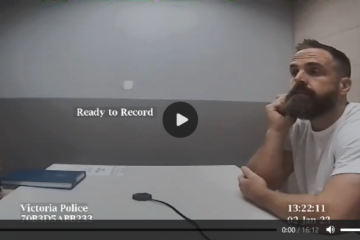on the 16th of december justice ginnane handed down his decision in the case of magee v wallace — he didn’t say anything about it in court, just said the appeal was dismissed, handed out the written decision and then awarded costs against me (after my half-arsed attempt to explain the stupidity and injustice of imposing costs on my thoroughly insolvent self).
here is the decision: [GINNANE DECISION] S CI 2013 05722 Magee v Wallace
even though i was fully aware that i would not really be listened to, would not be treated as a person, and would be ruled against, for some reason, before even reading the decision, i became extremely angry & depressed and decided i was a fool for ever engaging the legal system on its ye olde, secret-handshake terms.
of course, the process is there to alienate you, to wear you down, or to put you off even engaging in the first place — but i was surprised at my emotional response because i thought i knew all this and had just decided to do it anyway, i guess i just can’t help being disappointed by people sometimes… :(
after a couple of weeks over christmas, my anger and despair regarding the legal system subsided somewhat, and i decided i should at least try to take the matter further, even if i don’t have the requisite ye olde, secret-handshake knowledge or the energy to do it myself — so i have put in an application for pro-bono representation with “justice connect” (formerly the public interest law clearing house (pilch)) to see if anyone wants to help me with the case (any further appeal having to be lodged by the 29th of january).
i’m not confident anyone will want to help in such an unpopular and misunderstood case (that could be seized on by the ‘right-wing’ as a reason to abolish the charter), but it’s worth a try.
so to the decision of justice ginnane itself, i can summarise it best like this:
— the magistrate was in no error, none of his lines of reasoning (as questioned in this appeal) can be questioned because none of them formed part of his real reason — his real reason was to apply “the vibe” (à la dennis denuto) of justice kyrou in magee v delaney, which he did accurately, and despite the legal inaccuracy of such an approach, i am unwilling to criticise a magistrate who comprehended and applied “the vibe of kyrou” so aptly: “any legal nonsense goes, as long as this little shit loses”.
— saying that, justice kyrou was wrong to rule that section 15(3)a) of the charter included any rights other than those of “persons”, which the charter clearly defines as “human beings”.
— justice kyrou was also wrong to use “public policy considerations” to exclude all expressions involving “damage, or the threat of such damage” from protection of section 15(2).
— expressions must be considered on a case by case basis, and any exclusions from protection must be in accordance with the limitations included within the charter.
— this expression can be limited under section 15(3)b), because temporarily covering an advertisement is a threat to public order.
so this decision was much better than kyrou’s decision, but still another very annoying decision that places protection of the status quo (for-profit dominance) above accurate interpretation of the charter — i can’t really be fucked going through all the ways in which this decision is stupid, getting involved and invested in all the complexities makes me disappointed in myself, but i’ll start anyway and see if i gain momentum.
paragraph 44, which talks about how covering an advertisement threatens public order, is pretty special:
“Mr Magee’s actions concerned a commercial advertisement that was displayed in a space open to members of the public. His actions sought to prevent that advertisement from being displayed. I consider that such conduct is capable of interfering with the maintenance of public order. The capacity of individuals or businesses to obtain access to property to advertise their products or services is a feature of Australian society. Mr Magee’s actions, or similar actions taken in a public place which interfere with advertisements lawfully posted, have the capacity to interfere with public order. It is certainly possible that actions of the type that Mr. Magee engaged in might lead to some form of public disturbance involving persons seeking to stop those actions.”
so basically i am far more powerful than i thought — i thought i was just protesting this “feature of Australian society”, by very temporarily covering a minute fraction of it in soggy paper, so as to draw long overdue discussion and debate about the utility of this “feature” — but it seems i am actually threatening the “capacity of individuals or businesses to obtain access to property to advertise their products or services” through use of my tremendous force and vast material resources (the multinational ad companies don’t stand a chance with me “on the loose”, or “at large”)
i guess what these sorts of comments reveal is how conscious the legal system is of the consequences of widespread “revolt” — basically, we do have the power to decide to no longer put up with this awful “feature”, and the collective impact of our continuous opposition could totally destabilise the outdoor advertising industry and the mindset that the entire advertising industry is founded on — but luckily for the capitalist elites, “Australian society” seems more interested in grown men (who take the whole thing way too seriously, and cry when they lose) playing silly games with balls .
of course the courts could never in any way (even by accurately interpreting parliamentary legislation) sanction this kind of bottom-up power, they’re all about enforcing the top-down dictates of our perfect democracy.
also hilarious is how i shouldn’t be allowed to express an anti-advertising view in this way because people seeking to stop me (no one even has) would constitute a threat to public order — so if i’m not threatening public order by single-handedly abolishing the practice of corporate advertising across australia, i’m threatening public order by the fact that so many people will rush to stop me by applying physical force (without just calling the police like a normal dibber-dobber dumb-arse would).
i think this public order definition is legally incorrect, way too broad considering what precedent defines as public order (justice ginnane of course had no precedent for postering threatening public order), and will be a ground for any further appeal — i’d hope any further appeal would also agree with justice ginnane’s correct approach to applying section 15, overriding the crazy decison of kyrou.
i’ve kinda decided to drop the argument that a protected right establishes consent for posting bills (the posting bills provision is intended to stop people posting bills, so saying the charter can give consent would contravene the apparent purpose of the posting bills provision, which would be legally incorrect, even if the most revolutionary judge in australia was willing to rule that way, which they would not be) — instead i just want to have it found that my right to freedom of expression cannot be limited by section 15(3) or 7(2) of the charter, but cannot be consistently interpreted with the posting bills provision, so a declaration of inconsistent interpretation should be issued.
other things that shit me about the decision:
justice ginnane, at paragraph 7, agrees that the main rationale for magistrate capell’s decision was to apply legal-jazz-man justice kyrou’s ad libitum “damage, or threat of such damage” exclusion — but then he totally dismissed grounds 3 & 4 of the appeal that question the correctness of doing this, with no real explanation.
he did not answer whether or not my actions were a threat of damage (of course they clearly could not have been), he just brushed the whole thing aside at paragraph 66 (satanic?) disputing what he had already said in paragraph 7 (that “damage, or threat of such damage” was the magistrate’s main reason), then just flatly stated in the next paragraph that there was no error.
in paragraph 66, justice ginnane entered the oblique and mysterious realm of “the context of the [magistrates’] reasons read as a whole”, along with non-specific references to section 15 of the charter, stating that the magistrate considered that my actions could be equated with damage, without commenting as to whether this was correct or not.
as i said in my summary of the decision, it was as if justice ginnane was saying that whether the magistrate applied precedent or the law correctly was irrelevant — he had came to the right decision through a kind of justice unburdened by earthly demands for “reason” — it was immaculate justice, riding “the vibe” across a sea of fallacious legal technicalities — an approach which is laughable when practiced by a legal outsider like myself (or dennis denuto), but perfectly acceptable when done by an honorable member of the legal establishment.
this is particularly frustrating as it seems whenever technicality is on my side (and the law is never much more than technicality), i’m being a pathetic pedantic loser, advancing esoteric arguments because of the obvious weakness of my case, then the broad “common sense” arguments that are legally incorrect, totally useless for me, are rolled out over the top of legislation to uphold the status quo.
both broad arguments and technical arguments are not allowed for use in my defence, but both are acceptable for the purposes of prosecuting me.
the last thing i’ll say something about is ground 1, regarding the correctness of considering unquestionably legal alternatives.
i messed this ground up, i should have realised that justice kyrou did the same thing as magistrate capell (said that the fact i could have expressed myself in another way was a relevant consideration), and made the ground about how the magistrate applied precedent wrongly decided.
anyway, justice ginnane totally misinterpreted the authority of pointon v police (in the way the prosecution’s submissions lead him to, despite my verbal argument against this interpretation in court), dismissing it at footnote 18 (i’m not a lawyer but i don’t think it’s appropriate to include such critical decision-making in a footnote) as having no relevance to the case — he thought the high court was saying the district court applied the wrong test, but they weren’t (perhaps the confusion was caused by the fact that the district court did find the community magistrate had applied the wrong test).
the high court said the district court applied the right test, but the court’s reference to available alternatives cast doubt as to whether the court had applied the correct test to which it expressly referred, or had let other irrelevant considerations cloud their judgement.
if an appeal happens, i’d want to run that ground again also.
ahhhh, that’s it.
all this means i now have no ability to run a human rights defence to my upcoming hearings and appeals for postering charges (pending any further appeal), so i don’t know where i’ll go in terms of legal backing for my not guilty pleas.
i’m certainly always going to plead not guilty, but i think i need some kind of legal argument, no matter how ‘weak’ (if only to be used as an artistic instrument), to give me some pretext upon which to waffle on in court about my motives — i guess they could cut me short otherwise.
so i have a 70 day suspended sentence to appeal in the county court on the 29th of january, and if that appeal doesn’t go well, my hearing in the magistrate’s court on the 6th of february could trigger that jail sentence and add a new one.
the common criticisms (rarely voiced directly to me) jump to mind here: what are you achieving by getting thrown in jail? what have you even achieved in the ten years you’ve been doing this? if no one even knows about this, what’s the point? (these criticisms are posed as questions for my convenience)
i’m not achieving anything by getting thrown in jail, that’s the questionable “achievement” of the justice system — i am get thrown in jail for what i’ve already achieved: standing meaningfully and persistently against a social evil, registering my refusal to live alongside a practice that i know leads to nothing less than the continued suffering and death of millions — if all people who know the terrible effect of the for-profit media/advertising system achieved the same level of consistency between their thoughts and actions, this achievement wouldn’t be so easy to dismiss, we’d see this issue elevated immediately, across the globe, and resolved within a few short years.
this resistance isn’t futile, it’s the only thing that’s kept me going for 10 years and the only thing that continues to energise me — and even if i never have “success” with the whole “campaign” that is my life, and no one ever really knows or cares about this stand, i still prefer to do this than to just roll over and die (which i would be doing even if i was capable of living co-operatively within this system of death). :) :) :)


